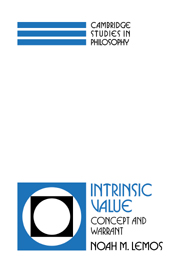Book contents
- Frontmatter
- Contents
- Preface
- Acknowledgments
- Part I Value, plurality, parts, and wholes
- 1 The concept of intrinsic value
- 2 The bearers of intrinsic value
- 3 Organic unities and the principle of universality
- 4 Higher goods and the myth of Tithonus
- 5 Pleasure and its intrinsic value
- 6 Consciousness, knowledge, and the consciousness thesis
- Part II Naturalism, nonnaturalism, and warrant
- Appendix A Chisholm's definition of organic unity
- Appendix B Some naturalistic analyses
- Selected bibliography
- Index
6 - Consciousness, knowledge, and the consciousness thesis
Published online by Cambridge University Press: 07 May 2010
- Frontmatter
- Contents
- Preface
- Acknowledgments
- Part I Value, plurality, parts, and wholes
- 1 The concept of intrinsic value
- 2 The bearers of intrinsic value
- 3 Organic unities and the principle of universality
- 4 Higher goods and the myth of Tithonus
- 5 Pleasure and its intrinsic value
- 6 Consciousness, knowledge, and the consciousness thesis
- Part II Naturalism, nonnaturalism, and warrant
- Appendix A Chisholm's definition of organic unity
- Appendix B Some naturalistic analyses
- Selected bibliography
- Index
Summary
Many philosophers have held that knowledge, understanding, and wisdom are intrinsically good. This is the view of Plato, Aristotle, St. Thomas, Brentano, and W. D. Ross. Yet many have questioned the intrinsic value of knowledge. Would it really be intrinsically good if someone knew how many lunar mountains are over 4,000 feet or knew every brand of peanut butter made in North America? Such knowledge strikes us as trivia, which is to say that we don't take it to be very valuable. In contrast to the views of many philosophers, Moore writes, “it appears that knowledge, though having little or no intrinsic value in itself, is an absolutely essential constituent in the highest goods, and contributes immensely to their value.” For Moore, knowledge is an element in certain great goods, but it has “little or no value in itself.”
What are we to say about the value of knowledge? It is clear that having correct beliefs or knowledge is intrinsically better than having incorrect beliefs. No one could fittingly prefer having incorrect beliefs to correct beliefs. Brentano tells us that preferring error for its own sake to correct belief is simply perverse. It is clear that having knowledge or correct beliefs is not intrinsically bad. No one could fittingly hate as such the having of knowledge or correct beliefs. Knowledge or correct belief must be either something intrinsically good or neutral. If either knowledge or correct belief is neutral, then each is most likely a positive neutral. If either were a negative or strict neutral, then, given what we've said in the last chapter, it would be intrinsically bad for anyone to take pleasure in someone's knowing something.
- Type
- Chapter
- Information
- Intrinsic ValueConcept and Warrant, pp. 88 - 100Publisher: Cambridge University PressPrint publication year: 1994



